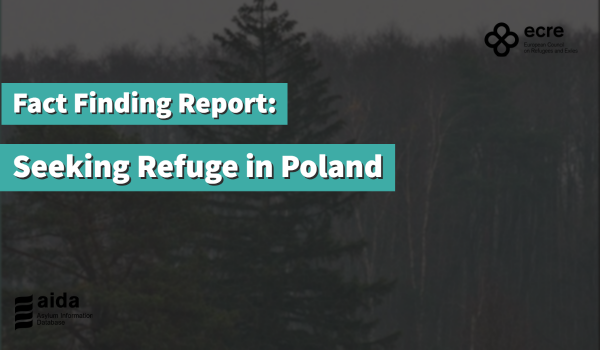In a report published following a visit to Poland in November 2022, ECRE examines practices at the borders and their implications for access to asylum and the reception conditions provided within the country. It also focuses on detention conditions for asylum seekers, an issue that various civil society stakeholders raised as an area of concern in the country.
At the beginning of the crisis at the Belarusian border in 2021, Poland became the centre of attention in Europe for its response to what it defined as a “hybrid attack” from the Lukashenko regime. Other voices were raised in concern about the conditions in which migrants, having been forced to the border by Belarusian border guards, were left to survive in Polish forests and the violent pushbacks to which they were subjected by Polish authorities. Poland also introduced specific legislative changes allowing for the immediate removal of individuals encountered while irregularly crossing the country’s “green border.” The national and European focus rapidly shifted to another Polish border after the outbreak of war in Ukraine. A very different response was given to the new arrivals, with Polish authorities and civil society organisations working together to grant access to Ukrainian refugees.
The treatment of asylum seekers at the Polish border with Belarus raises critical questions in terms of the effectiveness of procedural safeguards for protecting those trying to enter the country from refoulement and those surrounding arbitrary detention, as well as access to a fair and high quality asylum procedure. These issues become particularly noticeable when compared to the response given to displacement from Ukraine.
Those fleeing persecution and conflict who manage to reach Poland through Belarus may find themselves subjected to a preliminary examination of their protection claim with reduced procedural safeguards. Frequently, they are then removed from Polish territory and must appeal against the decision from Belarus, a country which does not grant fair access to asylum procedures, despite being a signatory of the Geneva Convention. As illustrated throughout this report, the procedure established at the border for determining whether applicants can access Polish territory for protection purposes poses particular challenges in terms of procedural fairness and respect for the principle of non-refoulement.
Those who access the territory irregularly and are not removed often face long periods of detention before being able to access the asylum procedure, including nationals from countries to which returns are suspended. As proper procedures for identifying vulnerabilities appear to be lacking, detention is also frequently used for vulnerable applicants, including children, and access to legal counselling and mental health services while in detention is often limited.
On the other hand, reception conditions appear to have improved in the country and only limited concerns were reported in that respect. However, it would appear that more funding still needs to be allocated, both to raise the amount of individual allowances for asylum seekers and to increase the number of staff employed at the centres. Among other things, this would ensure that asylum applicants are properly supported in their journey to inclusion within local communities.
For further information:
- AIDA, Country report Poland, 2021 Update, May 2022
This article appeared in the ECRE Weekly Bulletin. You can subscribe to the Weekly Bulletin here.

